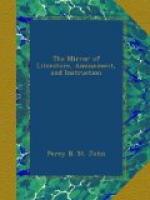* * * * *
The Selector;
AND
LITERARY NOTICES OF
NEW WORKS.
* * * * *
A PORTRAIT, BY MISS LANDON.
FROM “THE VENETIAN BRACELET, AND OTHER POEMS,” (JUST PUBLISHED)
“O No, sweet Lady, not to thee
That set and chilling tone,
By which the feelings on themselves
So utterly are thrown,
For mine has sprung upon my lips,
Impatient to express
The haunting charm of thy sweet voice
And gentlest loveliness.
A very fairy queen thou art,
Whose only spells are on the heart.
The garden it has many a flower,
But only one for thee—
The early graced of Grecian song,
The fragant myrtle tree;
For it doth speak of happy love,
The delicate, the true.
If its pearl buds are fair like thee,
They seem as fragile too;
Likeness, not omens; for love’s
power
Will watch his own most precious flower.
Thou art not of that wilder race
Upon the mountain side,
Able alike the summer sun
And winter blast to bide;
But thou art of that gentle growth
Which asks some loving eye
To keep it in sweet guardianship,
Or it must droop and die;
Requiring equal love and care,
Even more delicate than fair.
I cannot paint to thee the charm
Which thou hast wrought on
me;
Thy laugh, so like the wild bird’s
song
In the first bloom-touch’d
tree.
You spoke of lovely Italy,
And of its thousand flowers;
Your lips had caught the music breath
Amid its summer bow’rs.
And can it be a form like thine
Has braved the stormy Apennine?
I’m standing now with one white
rose
Where silver waters glide
I’ve flung that white rose on the
stream—
How light it breasts the tide!
The clear waves seem as if they loved
So beautiful a thing;
And fondly to the scented leaves
The laughing sunbeams cling.
A summer voyage—fairy freight;—
And such, sweet Lady, be thy fate!”




